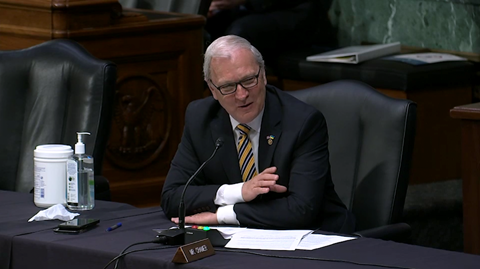Source: United States Senator Kevin Cramer (R-ND)
***Click here to download video. Click here for audio.***
WASHINGTON – At a Senate Armed Services Committee hearing on United States Strategic Command and United States Space Command posture, U.S. Senator Kevin Cramer (R-ND) discussed the importance of nuclear modernization, especially in light of Vladimir Putin’s unprovoked and unwarranted war against the freedom-loving people of Ukraine.
Senator Cramer began by highlighting the absurd criticism toward maintaining and modernizing a strong nuclear deterrence. He also sought assurances on rescheduling a recently postponed intercontinental ballistic missile test, given reports that Putin heightened Russia’s nuclear posture since the invasion of Ukraine.
“The suggestion that there has not been enough varying opinions to commit $630 billion over 10 years to the most important deterrence to aggression in the world is frightening enough, but it’s galling in the context that around here some people think nothing of spending trillions of dollars over the course of 10 months or 10 weeks or even 10 days based on the opinion of one person at [the U.S. Department of Health and Human Services]. With regard to the postponement of the ICBM launch – as you can imagine, those of us in North Dakota pay close attention to those things – I appreciated your answer and particularly your commitment that is only a postponement and is now rescheduled. It seems to me that reality is now clashing with some people’s fantasies. The reality of the moment… [is] our opponents’ actions are speaking as loudly as anything that we could probably say,” said Senator Cramer.
Senator Cramer specifically discussed modernization opportunities for the early warning systems at Cavalier Space Force Station with General James Dickinson, Commander of the United States Space Command. Cavalier Space Force Station is home to the Perimeter Acquisition Radar Attack Characterization System (PARCS) – one of the crucial radar arrays needed to monitor objects in space and detect missiles coming over the arctic.
“That particular sensor and all of those early warning radars are very critical to our overall architecture to be able to provide that missile warning, missile defense, and space domain awareness. [It is] so critical to providing that very decision space to our national-level leaders. So in terms of what that capability is today, we continue to look at that through lifecycle management. And really I work very closely with the Space Force because they’re ultimately in charge of those upgrades and the modernization of those assets… We work very closely with them and we’re looking at the entire architecture, not just necessarily one asset. As we look to the future, it will not only be a terrestrial base type of capability that is up there right now, but we’ll look at a space capability that augments that so we have a layered warning capability globally,” said General Dickinson.
Senator Cramer concluded by highlighting the real-world consequences of the delay or interruption of funding for nuclear modernization.
“Modernization is not just important, but critical. If we were to have the political will, would it even be possible to accelerate any part of modernization?” asked Senator Cramer.
“We need to ask questions differently. We used to ask what’s it going to take and we have gotten into the habit of thinking how are we going to mitigate our assumed delay or failure? We used to ask the question the other way around. That’s how we got to the moon by 1969. We need to get back to understanding the operational risk is on par with programmatic and technical risk, reverse the way we ask questions, and get back to producing capabilities the way we used to,” responded Admiral Charles Richard, Commander of the United States Strategic Command.
